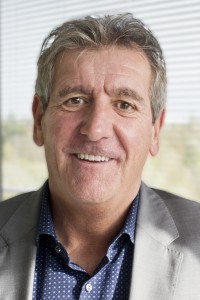
“It’s the pace of change that really excites me,” Cisco UKI’s Andy Chew muses after the briefest of pauses. “If you look at technology adoption in the last 20 to 25 years it’s extraordinary.”
We’re chatting to Cisco UKI’s Head of Architectures and Innovation, and a spark ignites in his eyes as we talk tech.
“If you think to a time not that long ago, to a time certainly in my working life – you didn’t have mobile phones. I can remember the time when car phones were first introduced and we saw the start of very basic mobile telephony,” he reflects.
“But if you fast forward to now; just look at how much computing power that you carry around with you in your pocket.
“Think of the number of applications that you use that device for, be that social media, managing your business, whatever else. The potential is practically unlimited.
“In my view if we’re looking forward then that pace of change will get even faster.”
The father-of-two clearly has a hard-wired love for technology, and a passion for the application of technology to solve important issues.
This is despite his admission it was a career path which he ‘fell into’ rather than setting out in that direction from the outset. But we’ll get into that later.
For now, Andy’s spark further ignites when he talks on the need to give more young disadvantaged people job opportunities in technology.
As a working class lad who came from a humble background in East London’s Forest Gate, to becoming a senior manager at one of the world’s leading technology companies, it’s something he knows only too well.
I ask if this is something the industry as a whole should be concerned about.
“It is a concern, yes, that kids from these backgrounds aren’t going into tech. How do we get more UK kids from these areas into tech? It’s about building their aspirations and showing them that anything is possible.
“They often don’t have the role models, and typically they aren’t aware of the openings or possibilities. This is, despite the real breadth within the technology industry, and the vast array of careers to get involved in.
“You need to give kids from inner cities or deprived urban areas the right encouragement so they can get on and achieve.
“We have to do a much better job at reaching out to the kids in those communities – technology is something they wouldn’t normally consider as a career.
“It’s about ensuring they know about the kind of skills that are really important within the tech industry outside the obvious STEM skills of science, engineering and maths.
“In my view, the really interesting part is around dealing with people in all forms of life and understanding the problems they face. It requires a lot of interpersonal skills, while also taking a general interest in the world around us. I think as an industry we do a poor job of giving kids that alternative perspective.”
It’s not just young people, where he feels there are barriers to access. There is more work to be done in getting greater numbers of women involved in IT across all areas and levels of the industry, and it’s an issue which he speaks passionately about.
“There are so many barriers here, especially when it comes to the image of tech.
“The reality is that women have the skills needed to be managers, to lead teams. They have the right attitude and an empathy and openness that can’t always be said for their male counterparts.
“But they don’t choose tech because they think it’s not the right environment, or they think that they don’t have the right skillset. That’s a huge challenge for the industry to overcome.”
As a father of two daughters, what approach does he take when advising them on their own career paths? With one just graduated with a degree in psychology and sociology, and his eldest daughter about to qualify as a lawyer; he can’t be doing too badly on this front.
“I try to encourage them not to have too many plans,” he said. “You work for a long time so you had better enjoy it.
“It’s all about embracing new things and having the courage to go down a path that you haven’t planned.”
Now more than two decades since he started on his own career, Andy is in his fifth year at Cisco and the charge of power behind his words only strengthens as we gaze towards the future again. It’s the transformational power of technology to create fundamental change which is clearly the source of this passion.
“It’s exciting to think about this technological change in other aspects of your life – look at your experience with the TV for example.
“It’s not that long ago since Sky came into play in the early 90s. Before then, people had access to three, maybe four channels for the best part of 30 to 40 years. Now, you essentially have access to what feels like an unlimited number.
“But more recently the industry had to change again and it’s now being driven by over the top providers such as Netflix, and the BBC iPlayer. The whole model of TV is changing at a fundamental level.
“You can think about that in a number of different areas – from computing, to broadcasting and beyond. Then there’s the way in which more and more technology is being embedded into cars.
“If you then think forward, and say – OK, that’s where we are today and that’s the speed of change in the past. There is a projected 30% increase in the number of mobile devices connected to internet in the next five years.
“Global mobile IP traffic is forecast to increase 10-fold in same period. Then you consider the Internet of Everything and that only 1 per cent of devices that could be connected to the web actually currently are.
“With all of that potential in mind, it’s my view that the pace of change is only going to accelerate further.”
Andy joined Cisco in 2007 to head up the Collaboration team in the Emerging Markets Theatre. The chance to lead and drive collaboration with Cisco was an “opportunity too good to miss”, he said.
He snapped the job up and left his role as global collaboration lead for Siemens – where he’d worked for seven years. It would be his first job back in the UK since the 90s, after spending a number of years overseas in global management roles.
“While they [Siemens] were early innovators, they didn’t go far enough,” he said.
“I’ve always been very multicultural and international – it was a huge decision to move back to a UK-only job after more than 20 years of more internationally-based roles. It was the right decision at the time though.
“I would highly recommend throwing yourself into other countries, working internationally and building or leading teams of diverse backgrounds. You learn so much from seeing how different people look at things and handle things.”
After a six month interview process with Cisco, Andy said it was the quality of the people at the company which finally drew him in.
“There’s such a positive attitude and mentality across the organisation.
“People will always help you find a solution here and there is a constant positive energy. You can really see the organisation puts effort in the right place and makes a difference.”
In 2012 he changed roles, and since then he’s been leading Cisco’s UK and Ireland architecture team of sales and technical specialists.
“I’m passionate about building and leading teams, developing and implementing strategies and helping people get the most out of themselves,” he enthused.
“I think a good manager needs desire, hunger, and the will to succeed, as well as a vision to motivate and inspire. More importantly you need to strive to create the right environment for people to succeed. A famous film Director once said his approach was to ‘hire good people and stay the hell out of the way’. There’s a lot to that.”
His career as an IT leader has spanned more than two decades, with Andy working in jobs on both sides of the Atlantic, as well as picking up an MBA from the Massachusetts Institute of Technology (MIT) along the way, where he is a Fellow of the Sloan School of Management. It is this time in the States which he looks back on the most fondly.
“We lived just outside of Boston and we had four great years there. I took my last year away from work so I could do my MBA with MIT.
“It was always something I wanted to do, and I was considering completing an executive MBA before I left the UK. But, this opportunity to go through the MIT Fellows programme came my way.
“It would have been foolhardy to turn that down, both from knowledge and experiential perspective because of the environment at that moment in time.
“I was over there in 2000 – so right at the time of the end of internet boom. It was a very exciting period. Really, it was the opportunity of a lifetime.
“It opened my mind to the long-term potential of technology to fundamentally change the world.
“And from a very personal perspective it gave me the confidence to think that I had the kind of skills and capabilities to lead in this new world era.”
As we get to the end of our time with Andy, we wrap up by summarising what he loves about Cisco and what’s next in store for him.
He says it’s all about affecting change and building teams that can do that. Having trust from a senior level is also vitally important, something which he gets from his role.
“I love the job because of the freedom and space it gives me. Phil Smith gives me permission to fail, and that’s important, as it’s inevitable from time to time.
“What’s next for me? I’m now at the stage in my life where I want to contribute back to Cisco more broadly. It’s not personal, more around figuring out what I can do for my company and the people I care about here. How and where I can contribute back in areas outside the company.
“I also now have a wonderful opportunity to help figure out how we take all our fantastic Innovation initiatives in the UK&I to the next level – whatever that means.”
As we wrap up our chat Andy is just about to dive straight into another meeting, but we squeeze in one final question. Does he have any final advice for aspiring leaders?
“Believe in the potential of people to do extraordinary things.”












